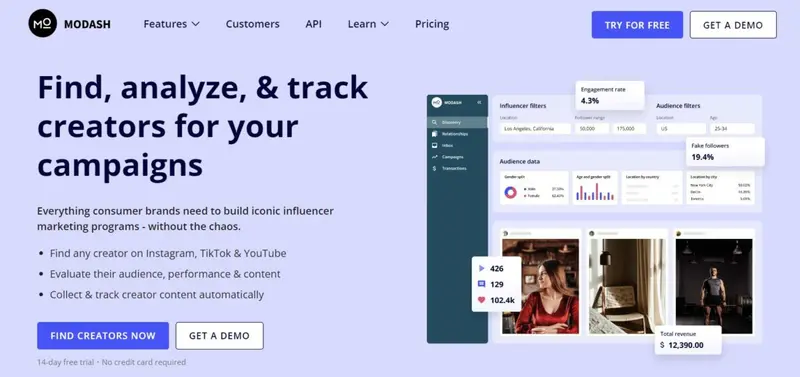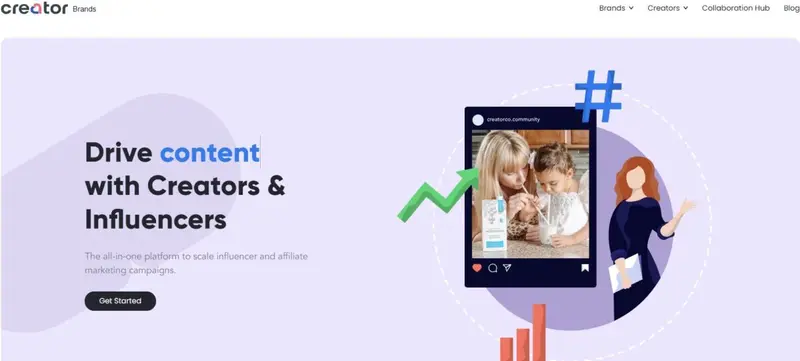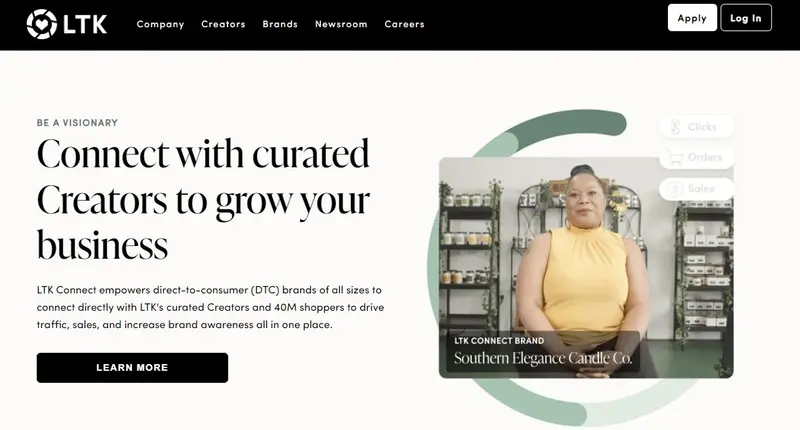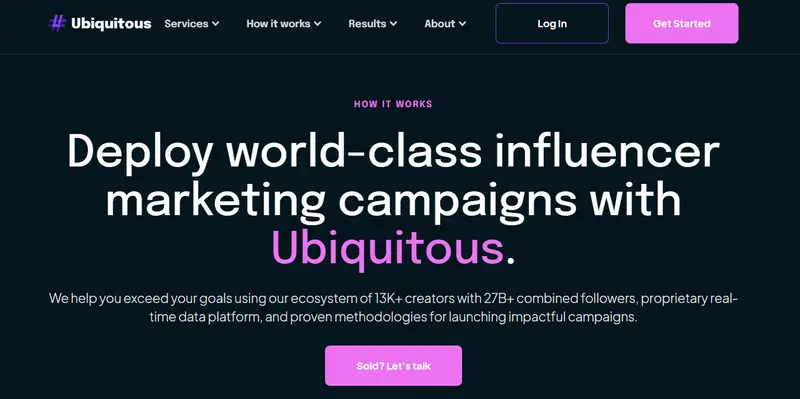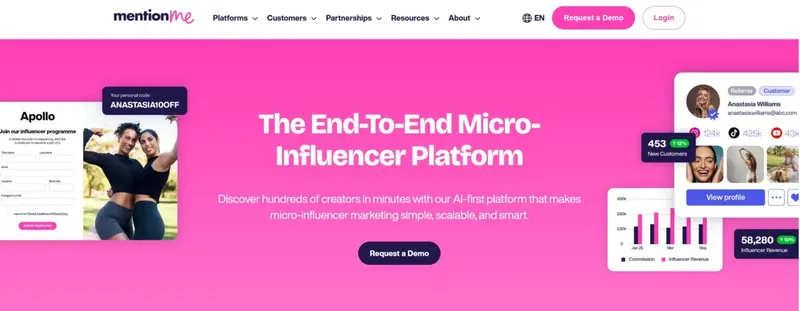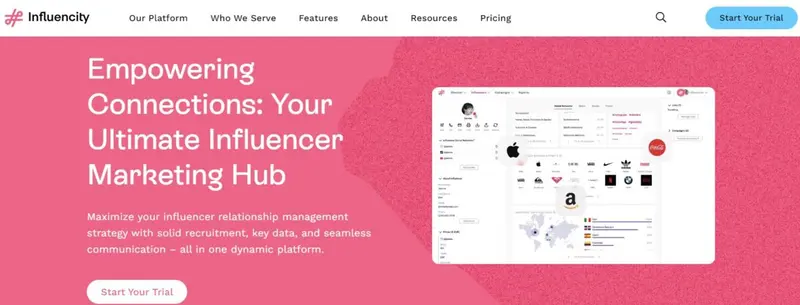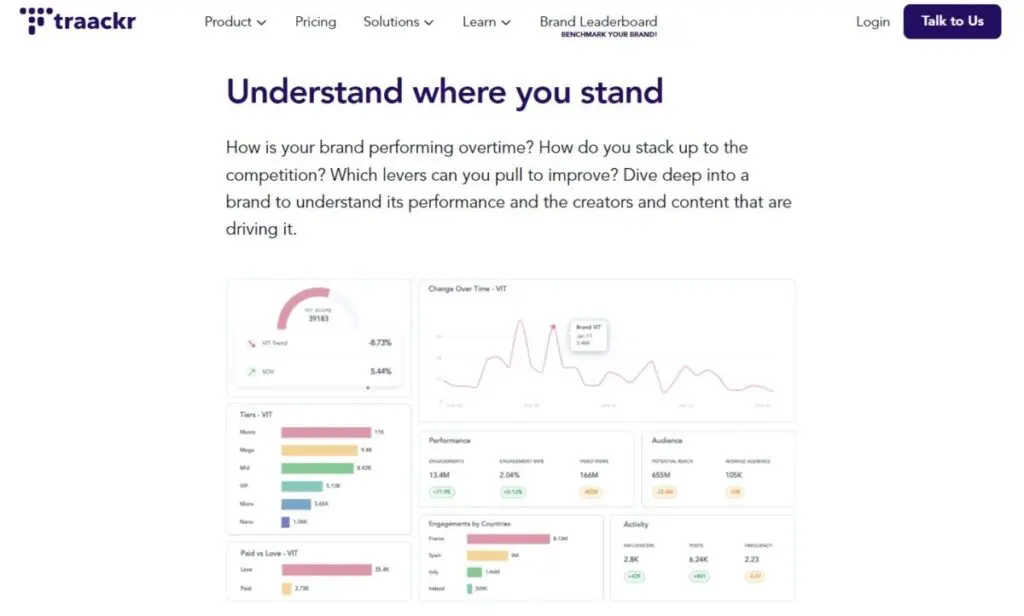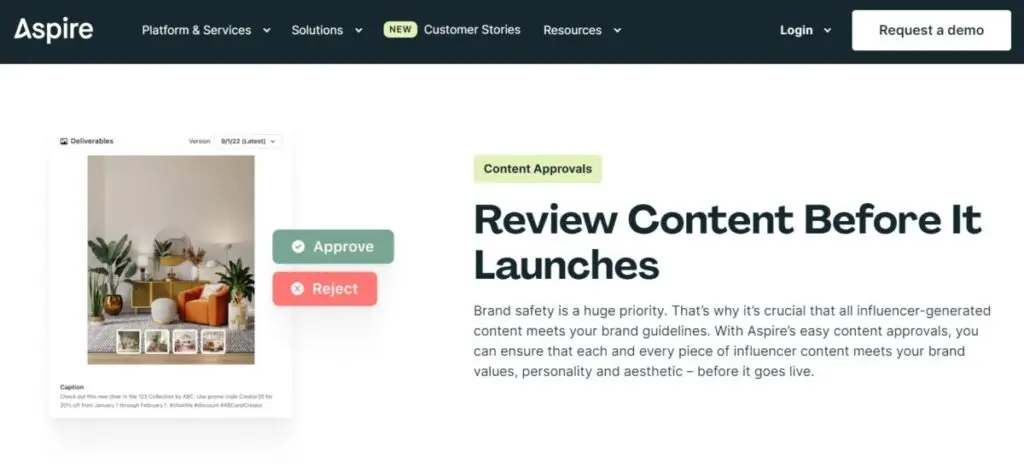The original promise of influencer marketing was an affordable alternative to traditional means of advertising in both print and digital. An influencer ad was far less expensive than a celebrity endorsement, sometimes with a bigger reach. It didn’t take long for influencer marketing to become an industry on its own, with the price of entry going up with each passing year.
This is why small businesses face more challenges when venturing into the realm of influencer marketing. Unlike their larger counterparts, small businesses often operate with limited budgets and smaller teams, which can significantly hinder their ability to engage in effective influencer campaigns.
This financial constraint means that small businesses must be strategic in their approach, often necessitating the use of specialized software to maximize their efforts while keeping costs manageable. But what about using software as a replacement for a full marketing department?
That’s an entirely different issue: the cost associated with influencer marketing. Large companies can afford to invest in comprehensive influencer marketing software that offers a wide array of features.
These sophisticated platforms often include capabilities for in-depth analytics, extensive influencer databases, automated campaign management, and detailed reporting. While these features are incredibly beneficial for any business, they often come with a hefty price tag—so we’ll give you three guesses as to who tends to use them.
Small businesses aren’t necessarily shut out entirely. Having lower budgets just forces them to do their homework, because there are affordable platforms that serve their needs. The trick is identifying something you need vs. something you want.
For a small business, these features are where the focus should be: influencer discovery/management, campaign management, and performance analytics. With these three, you get the core of every part of a campaign lifecycle.
It’s easy to be tempted by more bells and whistles, but many other features can likely be handled by other software you already have—or they just don’t add any value to the actual marketing.
It’s nice to customize the platform and all the communications to make it look like your own software, but none of that helps a post reach the right audience. Comprehensive CRM integrations add a deeper dimension to influencer relations, but small businesses can easily do that with a spreadsheet.
Things like automation and integrated budgeting tools are great if you can afford them—but you can absolutely do without them if needed.
Still, even armed with the knowledge of what you need, finding the right solution can be exhausting. The good news is, for most small businesses, the answer is right here in this blog post. These five platforms all offer something unique, and they all offer reasonably priced access to their tools:
Modash offers in-depth insights, the better to go deep into its massive influencer database with. Add a streamlined payment processing function, and you’ve got a small business winner. Modash was founded in 2018 with a mission to support content creators in getting paid for their work. Designed by founders Avery Schrader and Hendry Sadrak, Modash offers a comprehensive influencer marketing platform tailored to meet the needs of both brands and influencers. The platform aims to simplify influencer discovery and management, making it an excellent choice for small businesses looking to leverage influencer marketing effectively. Modash’s extensive database and user-friendly tools make it a standout solution in the influencer marketing space. Modash excels in its influencer discovery capabilities. It boasts a database of over 250 million influencers across Instagram, YouTube, and TikTok, all with more than 1,000 followers. This extensive database ensures that brands can find influencers that perfectly match their campaign needs. The platform allows users to refine searches using a variety of filters, like interests, demographics, and brand mentions. One of the standout features is the lookalike search, which helps brands find influencers similar to an ideal match they’ve already identified, broadening their pool of potential collaborators without additional effort. Once influencers are identified, Modash provides detailed profiles that offer deep insights into each influencer’s audience and performance. This is no surprise since it’s data like this that makes something like the lookalike feature possible. Profiles include standard data like engagement rates and audience Demographics but go deeper by also including fake follower detection and content analysis, which gives an overview of the influencer’s most popular content and any sponsored posts they have done. This detailed view helps small businesses make informed decisions about which influencers to work with, ensuring that campaigns are effective and targeted. Modash also includes a robust IRM tool for organizing and managing influencer interactions. Key features include: lists and labels for organizing influencers into lists, and attaching labels, notes, and documents to each influencer’s profile. An integration with Gmail lets users send and receive emails directly within the platform, keeping all communication centralized. Campaign Tracking monitors the status of influencer engagements, from invitations and hiring to product shipments and content submissions. These features help small businesses manage their influencer relationships efficiently, ensuring that all interactions are well-documented and easily accessible. It’s almost overkill for a small business, except that tools like these help small businesses become larger ones. While Modash does not offer any campaign management tools, it does provide excellent campaign monitoring and reporting features, tracking the performance of individual influencers and overall campaign metrics. For sales campaigns, Modash integrates with Shopify to track discount code usage, linking sales directly to influencer activities, all of which is neatly summarized into the reporting, along with metrics such as reach, engagement, and ROI, helping businesses assess the success of their campaigns. Modash simplifies the payment process with an escrow system that ensures influencers get paid for their work without hassle. The platform handles all payment transactions, relieving small businesses of the burden of managing multiple payment methods. Although the process of setting up payments could be more streamlined, once each payment has been defined that’s the end of it for brands. Modash’s team handles payment management from there, more than justifying the 5% fee charged on top of the influencer payments. For small businesses, Modash offers a powerful and user-friendly platform that excels in influencer discovery and relationship management. Its extensive database and detailed profiles enable precise and effective influencer marketing. The platform’s scalable pricing plans make it accessible to businesses of all sizes, allowing them to start small and expand as needed. While Modash lacks some advanced campaign management features, its strengths in discovery, monitoring, and payment processing make it an ideal choice for small businesses looking to leverage influencer marketing to grow their brand. Key Features: Campaign Management, Influencer Discovery, Influencer Analytics, Influencer Campaign Monitoring, Influencer Management, Beginning its life as an influencer marketplace, Creator.co evolved to become one of the best end-to-end platforms on the market—now, with affiliate marketing built-in. Creator.co was founded to bridge the gap between brands and influencers, particularly focusing on the power of micro-influencers. The platform has continuously adapted, adding features like affiliate marketing to leverage its network of 175,000 registered creators. Creator.co aims to provide an end-to-end solution for influencer marketing, making it a valuable tool for small businesses looking to grow their brand through authentic influencer partnerships. Creator.co’s Campaign Builder simplifies the process of creating influencer marketing campaigns. It is divided into four sections: General, Compensation, Requirements, and Deliverables. Users can define the campaign’s name, social channels (Instagram, YouTube, TikTok), and strategy. Whether sourcing user-generated content, product exchanges, or giveaways, the platform ensures all aspects are covered. Users can upload example images to set clear expectations for influencers, reducing the reliance on descriptions and enhancing campaign accuracy. Before going live, campaigns are reviewed by Creator.co’s team—even on the self-service plan—ensuring that all details are in order. Once approved, campaigns appear on the Collaboration Hub, where creators can search and apply using filters like brand, deliverable types, and social platforms. This streamlined approach allows creators to find campaigns that match their strengths and interests, fostering better collaborations and results. When creators apply to campaigns, brands can vet them using Creator.co’s “Deep Insights” reports. These reports provide comprehensive data, including engagement rates, audience insights, fake follower detection, and content analysis. The Deep Insights reports also include a 20+ page PDF with in-depth analysis, comparing engagement rates to community averages and highlighting influential followers. This extensive data helps brands make informed decisions, ensuring they select the best-fit influencers for their campaigns. Creator.co integrates affiliate marketing, allowing brands to run performance marketing campaigns using their network of influencers. The platform partners with major affiliate networks like Rakuten and Impact, enabling brands to manage campaigns across different networks from a single dashboard. For a small business, affiliate marketing is one of the most effective ways of building a low-key sales force without making any hires. Once influencers are selected, the campaign dashboards on Creator.co provide a clear and organized view of all activities. Users can navigate between pending opt-ins, performance metrics, and posted content. The reporting tools offer detailed insights into engagement, with metrics such as likes and comments translated into ROI. Additionally, audience insights are included in the reports, helping brands understand which demographics are most responsive to their campaigns. Creator.co stands out as an ideal influencer marketing platform for all businesses—not just the small ones. Though more expensive than previous entries in this list, Creator.co’s Self-Service plan should be within reach of any established small business. Its user-friendly campaign builder, extensive influencer database, and detailed vetting tools ensure that small brands can efficiently manage and execute effective influencer marketing campaigns. The integration of affiliate marketing further enhances its value, allowing businesses to combine influencer and performance marketing strategies seamlessly. Key Features: Search/Discovery, Automated Recruiting, Influencer Relationship Management, Influencer Marketplace, Content Review, Content Library, Campaign Management, Campaign Reporting, Influencer Analysis, Audience Analysis, E-commerce Tools, Product/Gifting Tools, Fake Follower/Fraud Detection, Payment Processing, Social Listening, Competitor Research, Creator Marketplace, Channels: Instagram, YouTube, TikTok For fashion and lifestyle brands, LTK connect gives access to an exclusive network of seasoned influencers with a proven track record of converting sales, backed by comprehensive data. All of LTK’s plans require a year commitment. LTK Connect, previously known as rewardStyle, was created by Amber Venz Box in 2010 to help fashion influencers monetize their content. Initially designed to link social posts to retailers for commissions, it has evolved into a comprehensive influencer marketing platform. The rebranding to LTK in 2020 enhanced its focus on a hybrid social media and shopping app. Today, LTK Connect supports over 200,000 curated creators and serves 10 million users, driving $3 billion in annual revenue for more than 6,000 brands and retailers. LTK Connect offers a streamlined campaign setup process. Brands can create campaigns with detailed descriptions, requirements, and compensation structures. The platform provides personalized assistance during the initial setup and ongoing support, ensuring that campaigns are well-planned and executed. Users can define the type of content they need, such as Instagram Stories, posts, and TikTok videos, with the platform automatically generating detailed requirements for each content type. LTK Connect’s discovery process is robust and efficient. Unlike open marketplaces, LTK is an invite-only platform where all creators are thoroughly vetted for professionalism and performance. This ensures that brands work with high-quality influencers who have a proven track record. The platform offers various categories to help brands find the right influencers, including top converters and up-and-coming creators. Detailed metrics, such as conversion rates from previous campaigns, are available to aid in decision-making. Data is a significant strength of LTK Connect. The platform provides comprehensive metrics, including sales, orders, conversion rates, and traffic sources, which can be fine-tuned for any date range. This detailed data helps brands track campaign performance accurately. Additionally, the integration with the LTK shopping app provides hard-to-argue with numbers about campaign success, focusing on tangible results like total sales and return on ad spend. LTK Connect emphasizes efficiency through automation. Payment methods are stored and automatically charged when posts are approved, ensuring timely compensation for creators. The platform’s notification system keeps users informed about any outstanding actions, further streamlining workflow. This attention to detail enhances the overall user experience, making campaign management straightforward and effective. For small businesses in the fashion and lifestyle sectors, LTK Connect offers a highly effective influencer marketing platform. Its user-friendly campaign setup, extensive data insights, and efficient workflow make it ideal for brands looking to leverage influencer marketing to drive sales. The invite-only network ensures access to top-quality creators, while the detailed reporting tools provide clear metrics on campaign performance. With scalable pricing plans, LTK Connect is accessible to businesses of all sizes, making it a valuable tool for brands aiming to grow their presence through influencer collaborations. Key Features: Search/Discovery, Content Review, Campaign Management, Campaign Reporting, Influencer Analysis, Audience Analysis, Product/Gifting Tools, Forms and Compliance, Payment Processing, Channels: Instagram, TikTok, YouTube, Facebook, Pinterest, Twitter, Blogs, LTK App Ubiquitous is a no-frills platform aimed at helping smaller companies with more limited budgets level the playing field on TikTok. Tailored to small brands, especially those looking to leverage TikTok for their marketing efforts, Ubiquitous emerged as a solution to the lack of effective tools for discovering and managing TikTok influencers. Founded by Jess Flack, who saw the potential of TikTok early on, Ubiquitous started as an agency and has worked with some pretty big names. Realizing that small businesses were underserved for TikTok marketing, they built a self-service platform to cater to those smaller brands with limited budgets. The platform aims to make influencer marketing accessible by providing essential tools for influencer discovery, campaign management, and performance tracking. Upon first logging into Ubiquitous, users encounter a clean dashboard designed for simplicity and efficiency. The platform’s standout feature is its campaign monitoring tool, which aggregates performance metrics of tracked URLs. Users can enter public URLs, including those of competitors to gather business intelligence. Creating campaigns in Ubiquitous is straightforward, primarily serving as an organizational tool rather than an automation platform. This is particularly beneficial for small businesses accustomed to manual processes. The platform’s influencer search function allows for targeted searches using various criteria such as category keywords, average views, and demographics, streamlining the discovery process significantly. Despite its strengths, Ubiquitous lacks certain advanced features such as creating lists of influencers, requiring external tools for comprehensive influencer management. However, its competitive pricing, starting at a free plan with basic functionalities and a premium plan at $29 per month, makes it an attractive option for small brands. Especially for those who are trying to get a handle on how to best market on TikTok (though the platform also works with Instagram and YouTube) Ubiquitous’s partnership with TikTok enhances its discovery database, offering access to a vast database of influencers. While the platform currently provides basic metrics due to TikTok’s data restrictions, it remains a valuable tool for small businesses seeking to navigate the influencer marketing landscape. Ubiquitous addresses a crucial market need by offering a scalable and user-friendly platform for small brands. Its focus on essential features, competitive pricing, and continuous improvements positions it as a valuable asset for businesses looking to leverage influencer marketing, particularly on TikTok. As the platform evolves, it promises to remain a significant player in helping small brands achieve their marketing goals through effective influencer collaborations. Key Features: Influencer Search & Discovery, Campaign Management, Content Creation, Influencer Marketing, Full Campaign Design, Channels: TikTok, Instagram, YouTube Mention Me takes a different angle from most small‑business influencer platforms. Instead of starting with a huge cold database, it uses first‑party referral and customer data to uncover high‑intent micro‑influencers who already buy from and believe in your brand. From there, its AI-first engine helps you find net-new creators, manage relationships, and track real revenue impact in a way that feels built for lean teams, not enterprise departments. Mention Me typically prices on a platform and usage model, with packages tailored to business size and growth goals, rather than a flat “per seat” fee. For small and scaling brands, this often means starting with a lighter plan focused on core discovery, program management, and performance tracking, then layering on advanced advocacy or referral features as results grow. Mention Me markets this as an “end‑to‑end micro‑influencer platform” that sits alongside its AI-powered referral stack. In practice, that gives small businesses something rare: a single system that can turn happy customers into creators, track their content and codes, and then feed that data back into broader acquisition and retention strategies. Where many tools push you straight into fishing massive influencer databases, Mention Me starts with your customer base. Its AI uses first‑party purchase and referral data to flag people who already act like advocates, then vets them on engagement, brand fit, and likely performance. That approach cuts down time spent hunting and reduces the risk of misaligned partnerships, something budget‑sensitive teams feel quickly. On the workflow side, small businesses get a single dashboard for applications, approvals, briefs, content reviews, messaging, and payments, so you do not have to glue together email, spreadsheets, and separate payment tools just to keep campaigns moving. Creators log into a simple portal where they see their briefs, rewards, and status in one place, which keeps questions and back‑and‑forth to a minimum and helps sustain the relationship over multiple campaigns. Measurement is where the platform leans heavily into its roots in referral and customer advocacy. Instead of relying on cookies and last‑click alone, Mention Me uses customer emails, voucher codes, and first‑party events to attribute revenue, referrals, and lifetime value back to specific micro‑influencer efforts. For small businesses, that level of clarity makes it easier to justify spend, compare creators, and decide which programs to scale and which to sunset. Primarily supports social‑led micro‑influencer campaigns across major platforms (such as Instagram and TikTok), with performance tied back to your owned channels and ecommerce stack via referral, voucher, and first‑party data connections. Key Features: Influencer Search & Discovery, Relationship Management, Campaign Management, Influencer Content Amplification, Influencer Outreach and Engagement, Data/Analytics, Influencer Lifecycle Management, Content Review, Campaign Management, Campaign Reporting, Forms and Compliance, Payment Processing, Competitor Research, Automated Commissions/Payment, First-Party Tracking, Channels: Instagram, Youtube, Tiktok, Facebook Influencity offers agency tools at small business prices, with appeal for brands of any size—influencer discovery is a particular standout. Influencity, launched in 2014, initially focused on Twitter but has since expanded its coverage to major social media platforms such as Instagram, TikTok, and YouTube. With a database of over 170 million influencer profiles, Influencity offers deep analytics and extensive data, making it a comprehensive tool for brands and agencies looking to optimize their influencer marketing strategies. And it’s well within the budget of all but the most cash-strapped businesses. Influencity’s influencer discovery module is a cornerstone of the platform, designed to handle vast amounts of data and streamline the search process. Users can apply a wide range of filters to find influencers who best match their campaign needs, going beyond basic vanity metrics into analytically deeper areas like interests, brand affinities, and demo- and psychographics. The platform’s lookalike search feature enhances efficiency by finding influencers similar to an ideal match identified by the user. This feature helps broaden the pool of potential collaborators without requiring additional effort. We called this a “nice-to-have” in the introduction at the top, and it comes at Influencity’s price point, it’s really nice to have: an IRM module that makes it simple to organize and analyze influencers, and even to get data insights into them as a group. These features are crucial for maintaining and managing relationships with influencers. By organizing influencers into lists and providing detailed insights, Influencity simplifies the planning, execution, and optimization of influencer marketing campaigns. Influencity’s campaign management module offers a holistic view of influencer groups and their potential impact on campaigns. Campaign planning is a lot easier when you have the tools to help, and Influencity’s tools do just that. Detailed post-campaign reports help brands assess the effectiveness of their campaigns, tracking metrics such as reach, engagement, conversions, and ROI. This module ensures that campaigns are not only well-executed but also yield measurable results. By providing a clear picture of performance, Influencity enables brands to refine their strategies and make data-driven decisions for future campaigns. Influencity offers numerous benefits that make it a valuable tool for both brands and agencies, which is why it’s impressive that small businesses can get in on the action, too. For small businesses, Influencity is a top-notch choice. Its user-friendly interface and efficient influencer discovery tools save valuable time and effort, making it easy to find influencers that perfectly match your brand’s needs. The detailed insights and performance metrics provided help ensure that your campaigns are not just effective but also impactful. What sets Influencity apart for small businesses is its flexible pricing. With plans starting at an affordable rate, small brands can access essential features without breaking the bank. This scalability means you can start small and expand as your needs grow, making Influencity a practical and powerful option for leveraging influencer marketing to boost your brand’s presence. In a nutshell, Influencity combines powerful features with affordability, making it an excellent platform for small businesses to harness the power of influencer marketing. Its comprehensive tools and scalable plans ensure that even with a limited budget, you can run effective campaigns and see meaningful results.
Key Features: Search/Discovery, Influencer Lifecycle Management, Influencer Relationship Management, Campaign Management, Campaign Reporting, Influencer Analysis, Audience Analysis, Fake Follower/Fraud Detection, Exportable reports, Team/Collaboration Tools, Channels: Instagram, YouTube, TikTok, Twitch1. Modash
Summary:
Pricing Plans:
Dive Deeper:
2. Creator.co
Summary:
Pricing Plans:
The Self-Serve plan gets you full access to the platform. While Creator.co offers higher levels of service, these just come with increasing levels of involvement from Creator.co; the platform remains the same.Diver Deeper:
3. LTK (formerly rewardStyle)
Summary:
Pricing Plans:
Dive Deeper:
4. Ubiquitous
Summary:
Pricing Plans:
Dive Deeper:
5. Mention Me
Pricing Plans:
Dive Deeper:
Key Features:
Channels:
6. Influencity
Summary:
Pricing Plans:
Dive Deeper:
What Are the Top Features of an Influencer Marketing Platform for Small Businesses?
There are countless influencer marketing platforms out there, each catering to different niches. You can find platforms tailored to:
- Influencer marketing platform for fitness influencers
- Influencer marketing platforms for sports influencers
- Influencer marketing platforms for agencies
- Influencer marketing platforms for creators
- Influencer marketing platforms in the US
- Influencer marketing platforms in the UK
These platforms help businesses expand their reach, tap into new markets, and build trust with customers, turning them into loyal advocates. To get the most out of your investment, your platform of choice should at least offer:
- Influencer Discovery: Find influencers that align with your brand values.
- CRM Tools: Streamline communication with influencers.
- Reporting & Tracking: Monitor campaign progress and performance.
Most platforms offer these standard tools, but to truly maximize your campaign, it's worth looking for features that provide distinct advantages. Let's dive into those.
Fraud Detection & Authenticity Verification
Fraudulent influencer activity has become a growing concern, with almost 50% of Instagram engagement suspected to be fake. For small businesses, this can lead to wasted time, money, and effort.
Look for platforms that provide fraud detection and authenticity verification. These features ensure you're working with real influencers who can deliver genuine results.
For example, Influencity uses AI and machine learning to detect fake followers and inflated engagement. Their ‘Followers Quality’ metric evaluates factors like follower count, bio details, and profile pictures to verify authenticity. Influencers scoring above 80 on this metric are generally considered trustworthy.
Neoreach also excels in fraud detection. Just provide the influencer’s social profile or URL, and Neoreach will generate a detailed report. It’s a handy tool for ensuring the influencers you work with are legitimate, both before and after a campaign.
Benchmarking
Roughly half of the brands using this marketing strategy find it hard to know if their campaigns are working. Benchmarking makes this easier by allowing businesses to compare their campaign results with industry standards and competitors, showing what works best and where they can improve.
Small businesses can use Traackr to compare their influencer marketing campaigns with those of their competitors. It tracks factors like engagement rates, reach, and content performance over different time periods and platforms.
The platform also offers tools to visualize data, making it easy to spot trends and gain insights quickly. Businesses can zoom in on specific groups of influencers, analyze markets in different areas, and study competitors' strategies in detail. By discovering who the top performers are and understanding impactful trends, small businesses can improve their influencer strategies and set clear, measurable goals.
- Traackr reports
Traackr also provides detailed reports that show where the business stands in terms of social media presence, influencer partnerships, and audience engagement. By understanding these benchmarks, you can identify successful strategies used by competitors and adapt their approach to get better results.
Content Management
Content is the backbone of any influencer marketing campaign. With 97% of marketers reporting success in content marketing in 2023, having a platform that integrates content management can streamline the entire process.
A good content management system (CMS) acts as a central hub for campaign planning, influencer communications, and content scheduling. It helps you stay organized, so you don’t have to dig through scattered emails and documents. You can manage workflows, store marketing assets securely, and even schedule posts to go live at the perfect time.
- Aspire.io content management
Aspire.io is an excellent example. This platform allows small businesses to plan, schedule, and track content across various platforms in real time. If a post is performing well, Aspire.io can boost it or convert it into an ad to expand its reach.
Wrapping Up
Influencer marketing can be an incredibly powerful tool for small businesses—if you know where to look and what you truly need. While it’s easy to be tempted by platforms with every feature under the sun, it’s more important to focus on the essentials: influencer discovery, campaign management, and performance analytics.
These five platforms offer a solid foundation for businesses looking to make a meaningful impact without breaking the bank. With the right strategy and the right tools, even the smallest brands can stand out in a crowded market.

